Evaluating the Value of Stakeholders in Corporate Governance
VerifiedAdded on 2023/04/20
|15
|4640
|453
Essay
AI Summary
This essay explores the critical role of corporate governance in balancing the interests of various stakeholders. It begins by defining corporate governance and highlighting its necessity in preventing managerial abuse of power, particularly within companies with separate legal identities as established in Salomon v A Salomon & Co Ltd. The essay then discusses different corporate governance theories, including agency theory, shareholder theory, and stakeholder theory, emphasizing the shift towards stakeholder theory to account for the diverse roles and importance of stakeholders in an organization's success. It identifies key stakeholders, such as employees, government, investors, the environment, consumers, and suppliers, and underscores the importance of stakeholder engagement. The essay concludes that considering all stakeholders is vital for corporate governance.

Corporate Governance
Running Head: COMMERCIAL LAW 0
1 2 / 2 2 / 2 0 1 8
Student’s Name
Running Head: COMMERCIAL LAW 0
1 2 / 2 2 / 2 0 1 8
Student’s Name
Paraphrase This Document
Need a fresh take? Get an instant paraphrase of this document with our AI Paraphraser
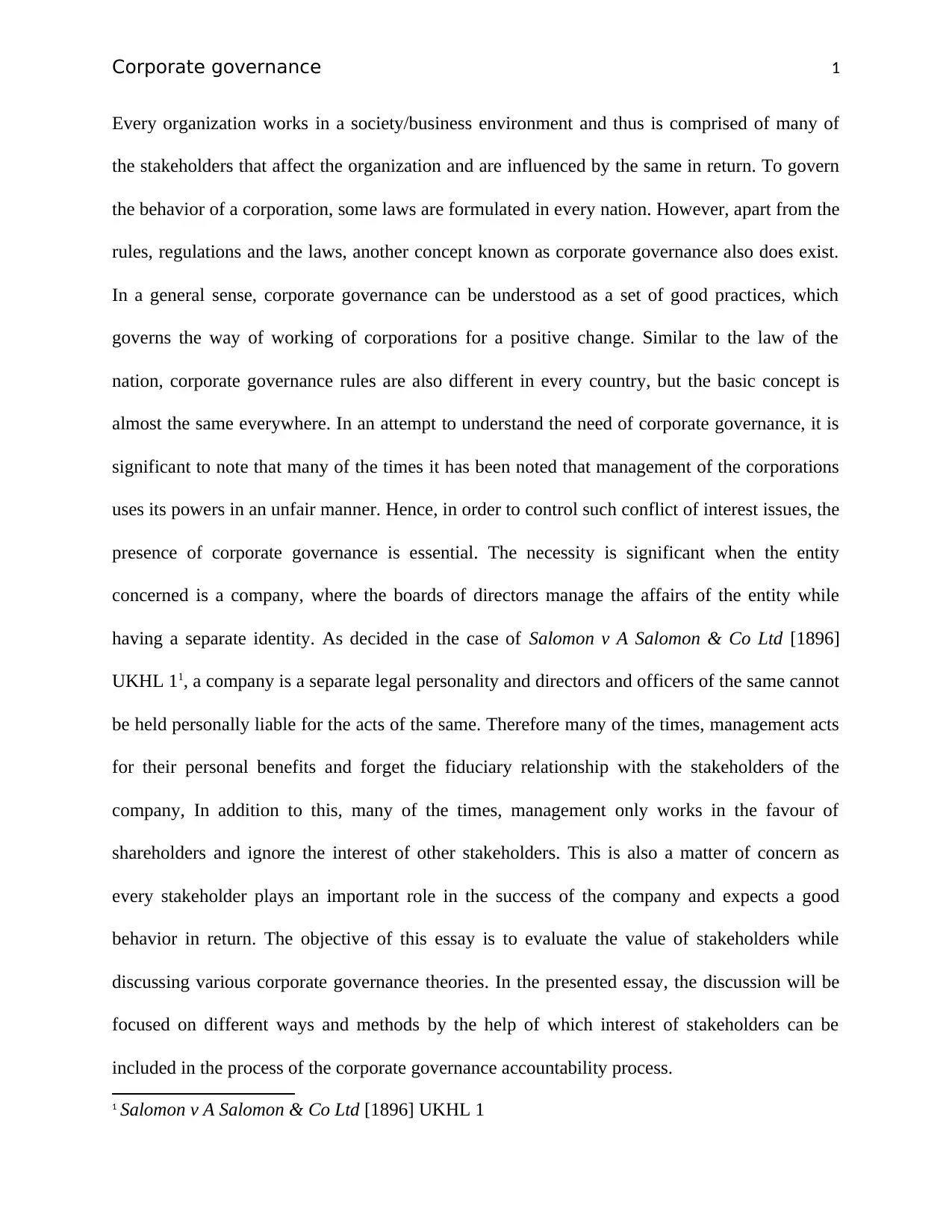
Corporate governance 1
Every organization works in a society/business environment and thus is comprised of many of
the stakeholders that affect the organization and are influenced by the same in return. To govern
the behavior of a corporation, some laws are formulated in every nation. However, apart from the
rules, regulations and the laws, another concept known as corporate governance also does exist.
In a general sense, corporate governance can be understood as a set of good practices, which
governs the way of working of corporations for a positive change. Similar to the law of the
nation, corporate governance rules are also different in every country, but the basic concept is
almost the same everywhere. In an attempt to understand the need of corporate governance, it is
significant to note that many of the times it has been noted that management of the corporations
uses its powers in an unfair manner. Hence, in order to control such conflict of interest issues, the
presence of corporate governance is essential. The necessity is significant when the entity
concerned is a company, where the boards of directors manage the affairs of the entity while
having a separate identity. As decided in the case of Salomon v A Salomon & Co Ltd [1896]
UKHL 11, a company is a separate legal personality and directors and officers of the same cannot
be held personally liable for the acts of the same. Therefore many of the times, management acts
for their personal benefits and forget the fiduciary relationship with the stakeholders of the
company, In addition to this, many of the times, management only works in the favour of
shareholders and ignore the interest of other stakeholders. This is also a matter of concern as
every stakeholder plays an important role in the success of the company and expects a good
behavior in return. The objective of this essay is to evaluate the value of stakeholders while
discussing various corporate governance theories. In the presented essay, the discussion will be
focused on different ways and methods by the help of which interest of stakeholders can be
included in the process of the corporate governance accountability process.
1 Salomon v A Salomon & Co Ltd [1896] UKHL 1
Every organization works in a society/business environment and thus is comprised of many of
the stakeholders that affect the organization and are influenced by the same in return. To govern
the behavior of a corporation, some laws are formulated in every nation. However, apart from the
rules, regulations and the laws, another concept known as corporate governance also does exist.
In a general sense, corporate governance can be understood as a set of good practices, which
governs the way of working of corporations for a positive change. Similar to the law of the
nation, corporate governance rules are also different in every country, but the basic concept is
almost the same everywhere. In an attempt to understand the need of corporate governance, it is
significant to note that many of the times it has been noted that management of the corporations
uses its powers in an unfair manner. Hence, in order to control such conflict of interest issues, the
presence of corporate governance is essential. The necessity is significant when the entity
concerned is a company, where the boards of directors manage the affairs of the entity while
having a separate identity. As decided in the case of Salomon v A Salomon & Co Ltd [1896]
UKHL 11, a company is a separate legal personality and directors and officers of the same cannot
be held personally liable for the acts of the same. Therefore many of the times, management acts
for their personal benefits and forget the fiduciary relationship with the stakeholders of the
company, In addition to this, many of the times, management only works in the favour of
shareholders and ignore the interest of other stakeholders. This is also a matter of concern as
every stakeholder plays an important role in the success of the company and expects a good
behavior in return. The objective of this essay is to evaluate the value of stakeholders while
discussing various corporate governance theories. In the presented essay, the discussion will be
focused on different ways and methods by the help of which interest of stakeholders can be
included in the process of the corporate governance accountability process.
1 Salomon v A Salomon & Co Ltd [1896] UKHL 1
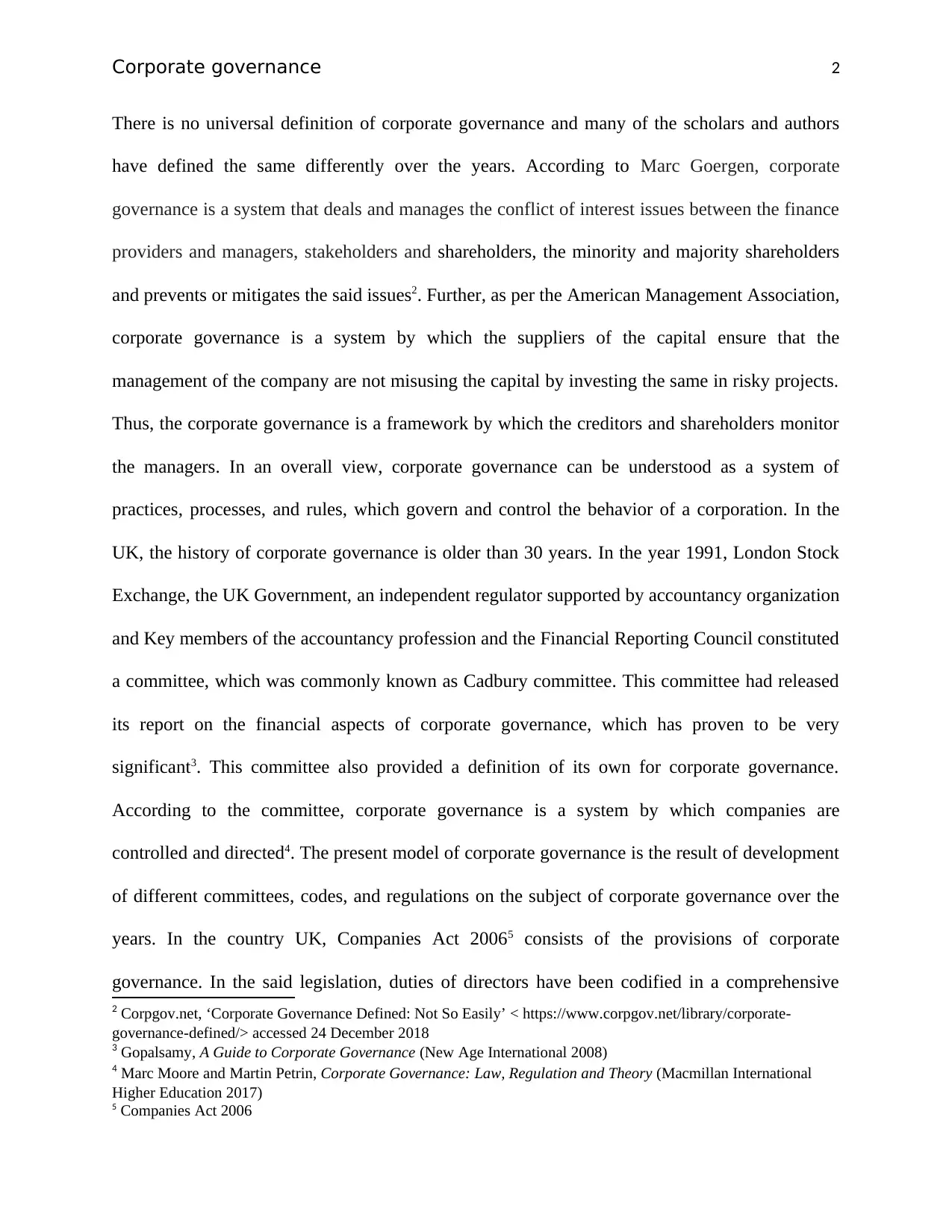
Corporate governance 2
There is no universal definition of corporate governance and many of the scholars and authors
have defined the same differently over the years. According to Marc Goergen, corporate
governance is a system that deals and manages the conflict of interest issues between the finance
providers and managers, stakeholders and shareholders, the minority and majority shareholders
and prevents or mitigates the said issues2. Further, as per the American Management Association,
corporate governance is a system by which the suppliers of the capital ensure that the
management of the company are not misusing the capital by investing the same in risky projects.
Thus, the corporate governance is a framework by which the creditors and shareholders monitor
the managers. In an overall view, corporate governance can be understood as a system of
practices, processes, and rules, which govern and control the behavior of a corporation. In the
UK, the history of corporate governance is older than 30 years. In the year 1991, London Stock
Exchange, the UK Government, an independent regulator supported by accountancy organization
and Key members of the accountancy profession and the Financial Reporting Council constituted
a committee, which was commonly known as Cadbury committee. This committee had released
its report on the financial aspects of corporate governance, which has proven to be very
significant3. This committee also provided a definition of its own for corporate governance.
According to the committee, corporate governance is a system by which companies are
controlled and directed4. The present model of corporate governance is the result of development
of different committees, codes, and regulations on the subject of corporate governance over the
years. In the country UK, Companies Act 20065 consists of the provisions of corporate
governance. In the said legislation, duties of directors have been codified in a comprehensive
2 Corpgov.net, ‘Corporate Governance Defined: Not So Easily’ < https://www.corpgov.net/library/corporate-
governance-defined/> accessed 24 December 2018
3 Gopalsamy, A Guide to Corporate Governance (New Age International 2008)
4 Marc Moore and Martin Petrin, Corporate Governance: Law, Regulation and Theory (Macmillan International
Higher Education 2017)
5 Companies Act 2006
There is no universal definition of corporate governance and many of the scholars and authors
have defined the same differently over the years. According to Marc Goergen, corporate
governance is a system that deals and manages the conflict of interest issues between the finance
providers and managers, stakeholders and shareholders, the minority and majority shareholders
and prevents or mitigates the said issues2. Further, as per the American Management Association,
corporate governance is a system by which the suppliers of the capital ensure that the
management of the company are not misusing the capital by investing the same in risky projects.
Thus, the corporate governance is a framework by which the creditors and shareholders monitor
the managers. In an overall view, corporate governance can be understood as a system of
practices, processes, and rules, which govern and control the behavior of a corporation. In the
UK, the history of corporate governance is older than 30 years. In the year 1991, London Stock
Exchange, the UK Government, an independent regulator supported by accountancy organization
and Key members of the accountancy profession and the Financial Reporting Council constituted
a committee, which was commonly known as Cadbury committee. This committee had released
its report on the financial aspects of corporate governance, which has proven to be very
significant3. This committee also provided a definition of its own for corporate governance.
According to the committee, corporate governance is a system by which companies are
controlled and directed4. The present model of corporate governance is the result of development
of different committees, codes, and regulations on the subject of corporate governance over the
years. In the country UK, Companies Act 20065 consists of the provisions of corporate
governance. In the said legislation, duties of directors have been codified in a comprehensive
2 Corpgov.net, ‘Corporate Governance Defined: Not So Easily’ < https://www.corpgov.net/library/corporate-
governance-defined/> accessed 24 December 2018
3 Gopalsamy, A Guide to Corporate Governance (New Age International 2008)
4 Marc Moore and Martin Petrin, Corporate Governance: Law, Regulation and Theory (Macmillan International
Higher Education 2017)
5 Companies Act 2006
⊘ This is a preview!⊘
Do you want full access?
Subscribe today to unlock all pages.

Trusted by 1+ million students worldwide
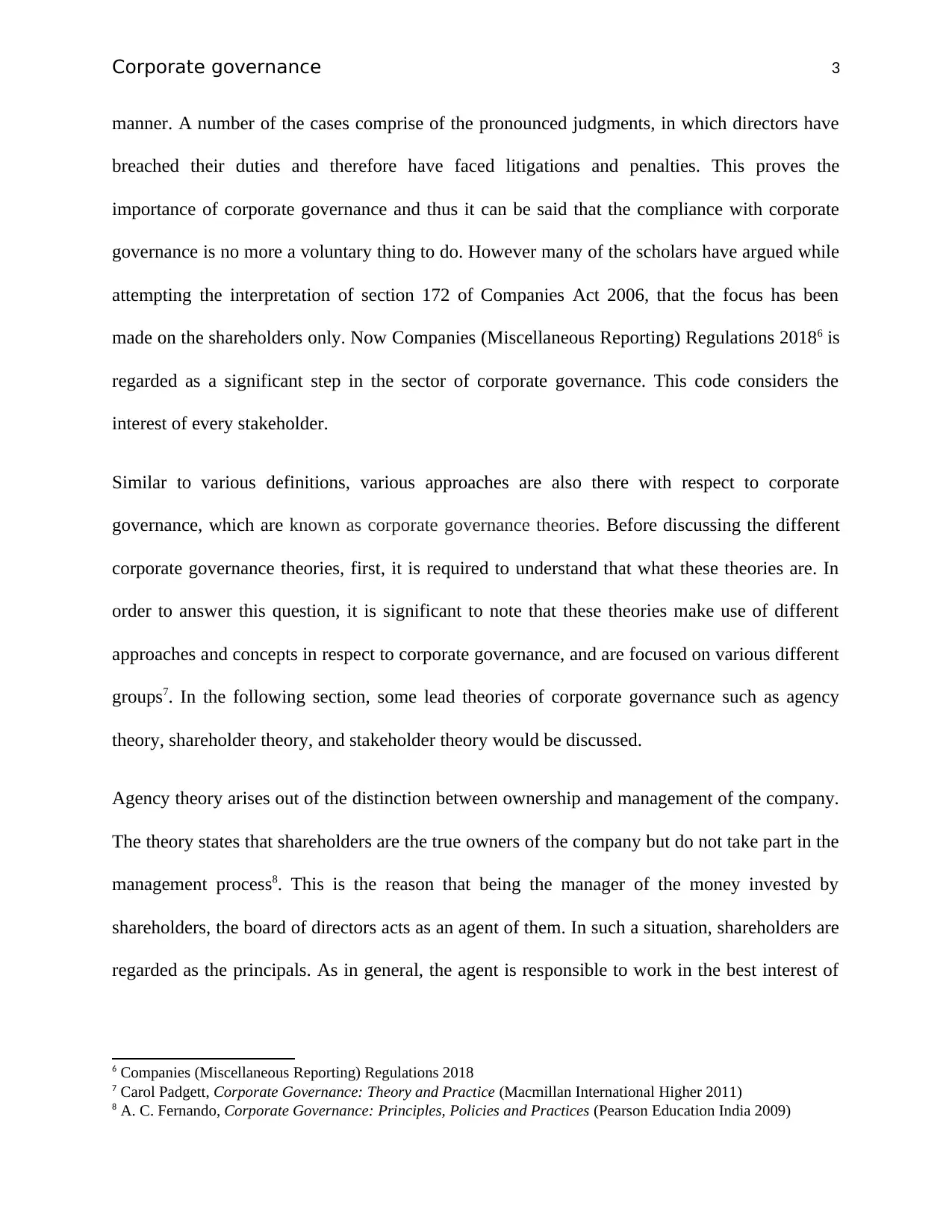
Corporate governance 3
manner. A number of the cases comprise of the pronounced judgments, in which directors have
breached their duties and therefore have faced litigations and penalties. This proves the
importance of corporate governance and thus it can be said that the compliance with corporate
governance is no more a voluntary thing to do. However many of the scholars have argued while
attempting the interpretation of section 172 of Companies Act 2006, that the focus has been
made on the shareholders only. Now Companies (Miscellaneous Reporting) Regulations 20186 is
regarded as a significant step in the sector of corporate governance. This code considers the
interest of every stakeholder.
Similar to various definitions, various approaches are also there with respect to corporate
governance, which are known as corporate governance theories. Before discussing the different
corporate governance theories, first, it is required to understand that what these theories are. In
order to answer this question, it is significant to note that these theories make use of different
approaches and concepts in respect to corporate governance, and are focused on various different
groups7. In the following section, some lead theories of corporate governance such as agency
theory, shareholder theory, and stakeholder theory would be discussed.
Agency theory arises out of the distinction between ownership and management of the company.
The theory states that shareholders are the true owners of the company but do not take part in the
management process8. This is the reason that being the manager of the money invested by
shareholders, the board of directors acts as an agent of them. In such a situation, shareholders are
regarded as the principals. As in general, the agent is responsible to work in the best interest of
6 Companies (Miscellaneous Reporting) Regulations 2018
7 Carol Padgett, Corporate Governance: Theory and Practice (Macmillan International Higher 2011)
8 A. C. Fernando, Corporate Governance: Principles, Policies and Practices (Pearson Education India 2009)
manner. A number of the cases comprise of the pronounced judgments, in which directors have
breached their duties and therefore have faced litigations and penalties. This proves the
importance of corporate governance and thus it can be said that the compliance with corporate
governance is no more a voluntary thing to do. However many of the scholars have argued while
attempting the interpretation of section 172 of Companies Act 2006, that the focus has been
made on the shareholders only. Now Companies (Miscellaneous Reporting) Regulations 20186 is
regarded as a significant step in the sector of corporate governance. This code considers the
interest of every stakeholder.
Similar to various definitions, various approaches are also there with respect to corporate
governance, which are known as corporate governance theories. Before discussing the different
corporate governance theories, first, it is required to understand that what these theories are. In
order to answer this question, it is significant to note that these theories make use of different
approaches and concepts in respect to corporate governance, and are focused on various different
groups7. In the following section, some lead theories of corporate governance such as agency
theory, shareholder theory, and stakeholder theory would be discussed.
Agency theory arises out of the distinction between ownership and management of the company.
The theory states that shareholders are the true owners of the company but do not take part in the
management process8. This is the reason that being the manager of the money invested by
shareholders, the board of directors acts as an agent of them. In such a situation, shareholders are
regarded as the principals. As in general, the agent is responsible to work in the best interest of
6 Companies (Miscellaneous Reporting) Regulations 2018
7 Carol Padgett, Corporate Governance: Theory and Practice (Macmillan International Higher 2011)
8 A. C. Fernando, Corporate Governance: Principles, Policies and Practices (Pearson Education India 2009)
Paraphrase This Document
Need a fresh take? Get an instant paraphrase of this document with our AI Paraphraser
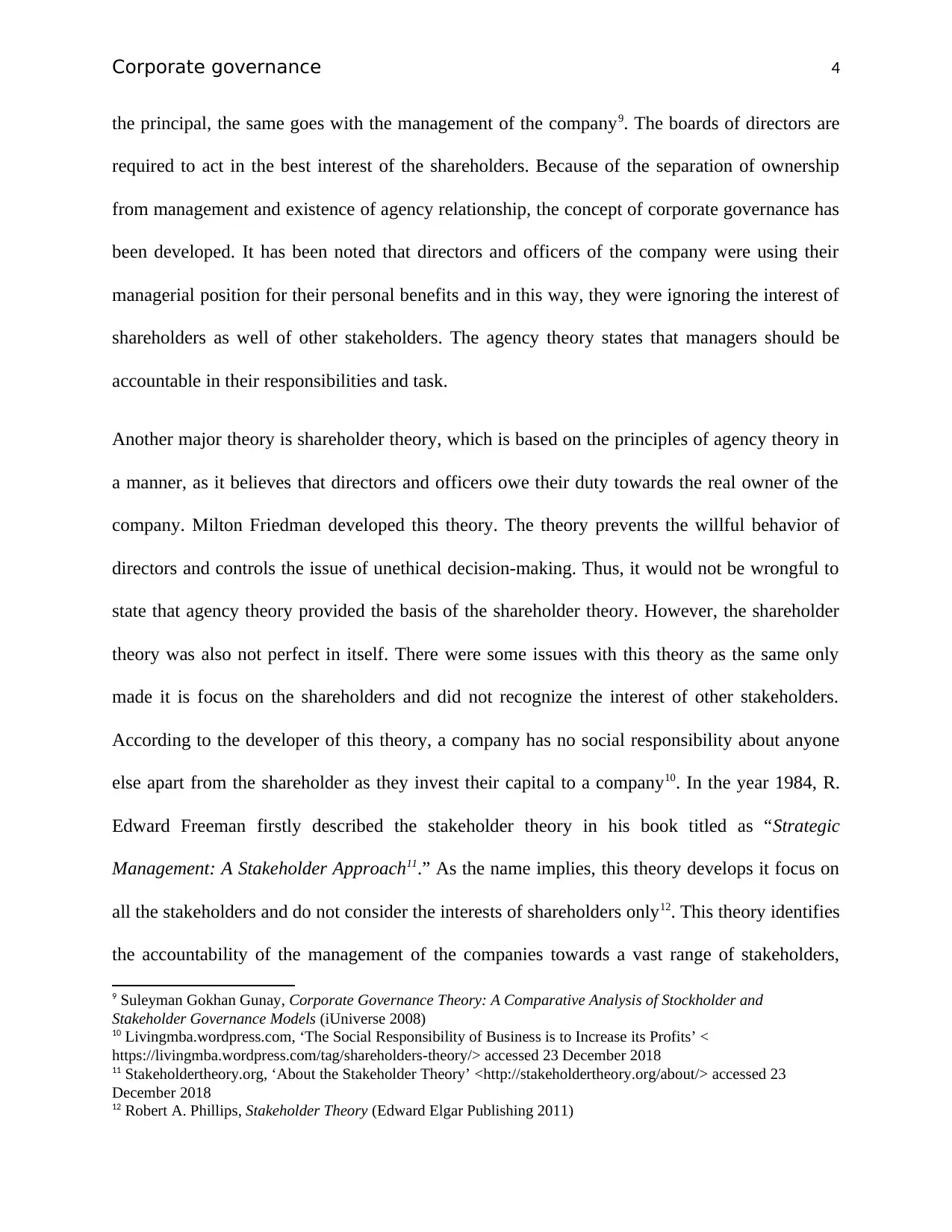
Corporate governance 4
the principal, the same goes with the management of the company9. The boards of directors are
required to act in the best interest of the shareholders. Because of the separation of ownership
from management and existence of agency relationship, the concept of corporate governance has
been developed. It has been noted that directors and officers of the company were using their
managerial position for their personal benefits and in this way, they were ignoring the interest of
shareholders as well of other stakeholders. The agency theory states that managers should be
accountable in their responsibilities and task.
Another major theory is shareholder theory, which is based on the principles of agency theory in
a manner, as it believes that directors and officers owe their duty towards the real owner of the
company. Milton Friedman developed this theory. The theory prevents the willful behavior of
directors and controls the issue of unethical decision-making. Thus, it would not be wrongful to
state that agency theory provided the basis of the shareholder theory. However, the shareholder
theory was also not perfect in itself. There were some issues with this theory as the same only
made it is focus on the shareholders and did not recognize the interest of other stakeholders.
According to the developer of this theory, a company has no social responsibility about anyone
else apart from the shareholder as they invest their capital to a company10. In the year 1984, R.
Edward Freeman firstly described the stakeholder theory in his book titled as “Strategic
Management: A Stakeholder Approach11.” As the name implies, this theory develops it focus on
all the stakeholders and do not consider the interests of shareholders only12. This theory identifies
the accountability of the management of the companies towards a vast range of stakeholders,
9 Suleyman Gokhan Gunay, Corporate Governance Theory: A Comparative Analysis of Stockholder and
Stakeholder Governance Models (iUniverse 2008)
10 Livingmba.wordpress.com, ‘The Social Responsibility of Business is to Increase its Profits’ <
https://livingmba.wordpress.com/tag/shareholders-theory/> accessed 23 December 2018
11 Stakeholdertheory.org, ‘About the Stakeholder Theory’ <http://stakeholdertheory.org/about/> accessed 23
December 2018
12 Robert A. Phillips, Stakeholder Theory (Edward Elgar Publishing 2011)
the principal, the same goes with the management of the company9. The boards of directors are
required to act in the best interest of the shareholders. Because of the separation of ownership
from management and existence of agency relationship, the concept of corporate governance has
been developed. It has been noted that directors and officers of the company were using their
managerial position for their personal benefits and in this way, they were ignoring the interest of
shareholders as well of other stakeholders. The agency theory states that managers should be
accountable in their responsibilities and task.
Another major theory is shareholder theory, which is based on the principles of agency theory in
a manner, as it believes that directors and officers owe their duty towards the real owner of the
company. Milton Friedman developed this theory. The theory prevents the willful behavior of
directors and controls the issue of unethical decision-making. Thus, it would not be wrongful to
state that agency theory provided the basis of the shareholder theory. However, the shareholder
theory was also not perfect in itself. There were some issues with this theory as the same only
made it is focus on the shareholders and did not recognize the interest of other stakeholders.
According to the developer of this theory, a company has no social responsibility about anyone
else apart from the shareholder as they invest their capital to a company10. In the year 1984, R.
Edward Freeman firstly described the stakeholder theory in his book titled as “Strategic
Management: A Stakeholder Approach11.” As the name implies, this theory develops it focus on
all the stakeholders and do not consider the interests of shareholders only12. This theory identifies
the accountability of the management of the companies towards a vast range of stakeholders,
9 Suleyman Gokhan Gunay, Corporate Governance Theory: A Comparative Analysis of Stockholder and
Stakeholder Governance Models (iUniverse 2008)
10 Livingmba.wordpress.com, ‘The Social Responsibility of Business is to Increase its Profits’ <
https://livingmba.wordpress.com/tag/shareholders-theory/> accessed 23 December 2018
11 Stakeholdertheory.org, ‘About the Stakeholder Theory’ <http://stakeholdertheory.org/about/> accessed 23
December 2018
12 Robert A. Phillips, Stakeholder Theory (Edward Elgar Publishing 2011)
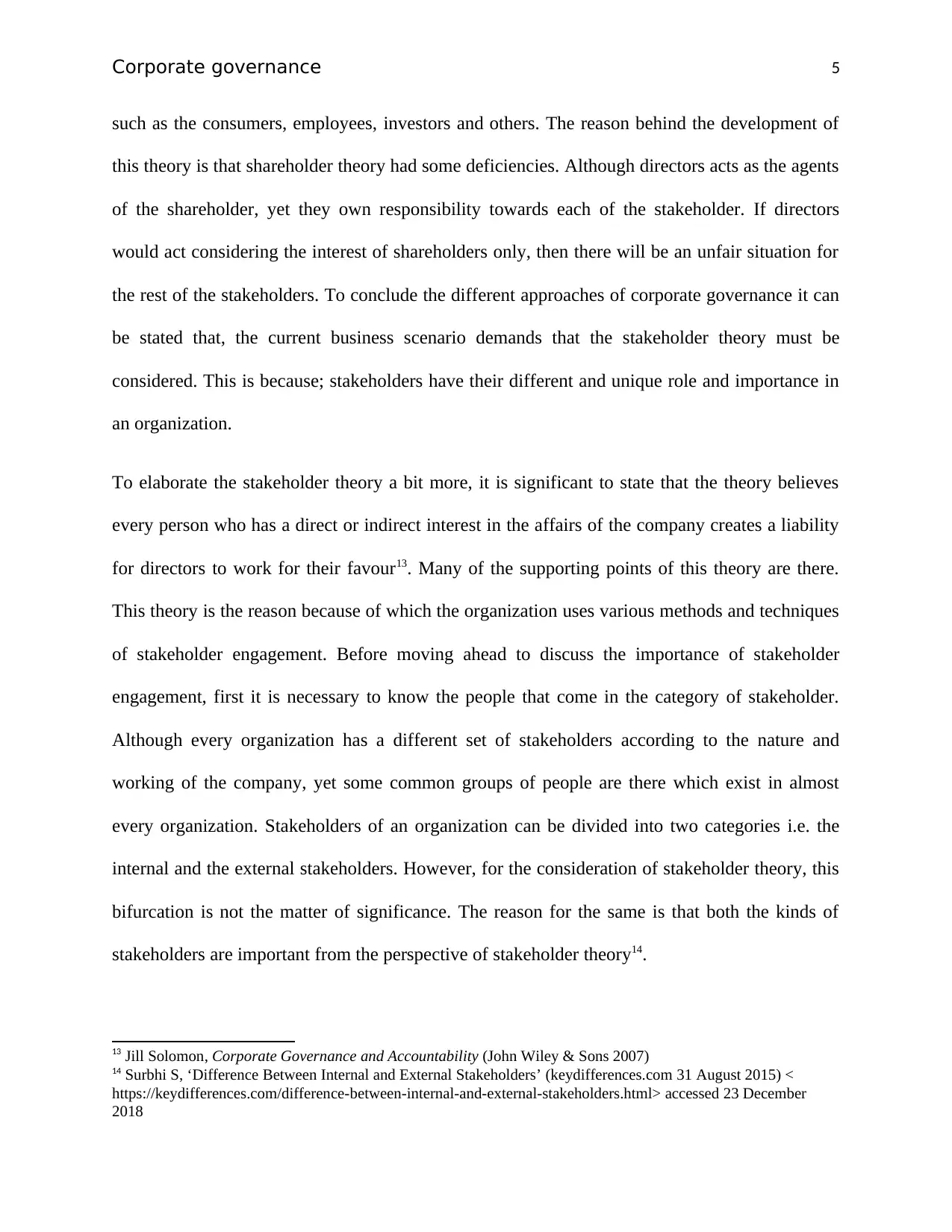
Corporate governance 5
such as the consumers, employees, investors and others. The reason behind the development of
this theory is that shareholder theory had some deficiencies. Although directors acts as the agents
of the shareholder, yet they own responsibility towards each of the stakeholder. If directors
would act considering the interest of shareholders only, then there will be an unfair situation for
the rest of the stakeholders. To conclude the different approaches of corporate governance it can
be stated that, the current business scenario demands that the stakeholder theory must be
considered. This is because; stakeholders have their different and unique role and importance in
an organization.
To elaborate the stakeholder theory a bit more, it is significant to state that the theory believes
every person who has a direct or indirect interest in the affairs of the company creates a liability
for directors to work for their favour13. Many of the supporting points of this theory are there.
This theory is the reason because of which the organization uses various methods and techniques
of stakeholder engagement. Before moving ahead to discuss the importance of stakeholder
engagement, first it is necessary to know the people that come in the category of stakeholder.
Although every organization has a different set of stakeholders according to the nature and
working of the company, yet some common groups of people are there which exist in almost
every organization. Stakeholders of an organization can be divided into two categories i.e. the
internal and the external stakeholders. However, for the consideration of stakeholder theory, this
bifurcation is not the matter of significance. The reason for the same is that both the kinds of
stakeholders are important from the perspective of stakeholder theory14.
13 Jill Solomon, Corporate Governance and Accountability (John Wiley & Sons 2007)
14 Surbhi S, ‘Difference Between Internal and External Stakeholders’ (keydifferences.com 31 August 2015) <
https://keydifferences.com/difference-between-internal-and-external-stakeholders.html> accessed 23 December
2018
such as the consumers, employees, investors and others. The reason behind the development of
this theory is that shareholder theory had some deficiencies. Although directors acts as the agents
of the shareholder, yet they own responsibility towards each of the stakeholder. If directors
would act considering the interest of shareholders only, then there will be an unfair situation for
the rest of the stakeholders. To conclude the different approaches of corporate governance it can
be stated that, the current business scenario demands that the stakeholder theory must be
considered. This is because; stakeholders have their different and unique role and importance in
an organization.
To elaborate the stakeholder theory a bit more, it is significant to state that the theory believes
every person who has a direct or indirect interest in the affairs of the company creates a liability
for directors to work for their favour13. Many of the supporting points of this theory are there.
This theory is the reason because of which the organization uses various methods and techniques
of stakeholder engagement. Before moving ahead to discuss the importance of stakeholder
engagement, first it is necessary to know the people that come in the category of stakeholder.
Although every organization has a different set of stakeholders according to the nature and
working of the company, yet some common groups of people are there which exist in almost
every organization. Stakeholders of an organization can be divided into two categories i.e. the
internal and the external stakeholders. However, for the consideration of stakeholder theory, this
bifurcation is not the matter of significance. The reason for the same is that both the kinds of
stakeholders are important from the perspective of stakeholder theory14.
13 Jill Solomon, Corporate Governance and Accountability (John Wiley & Sons 2007)
14 Surbhi S, ‘Difference Between Internal and External Stakeholders’ (keydifferences.com 31 August 2015) <
https://keydifferences.com/difference-between-internal-and-external-stakeholders.html> accessed 23 December
2018
⊘ This is a preview!⊘
Do you want full access?
Subscribe today to unlock all pages.

Trusted by 1+ million students worldwide
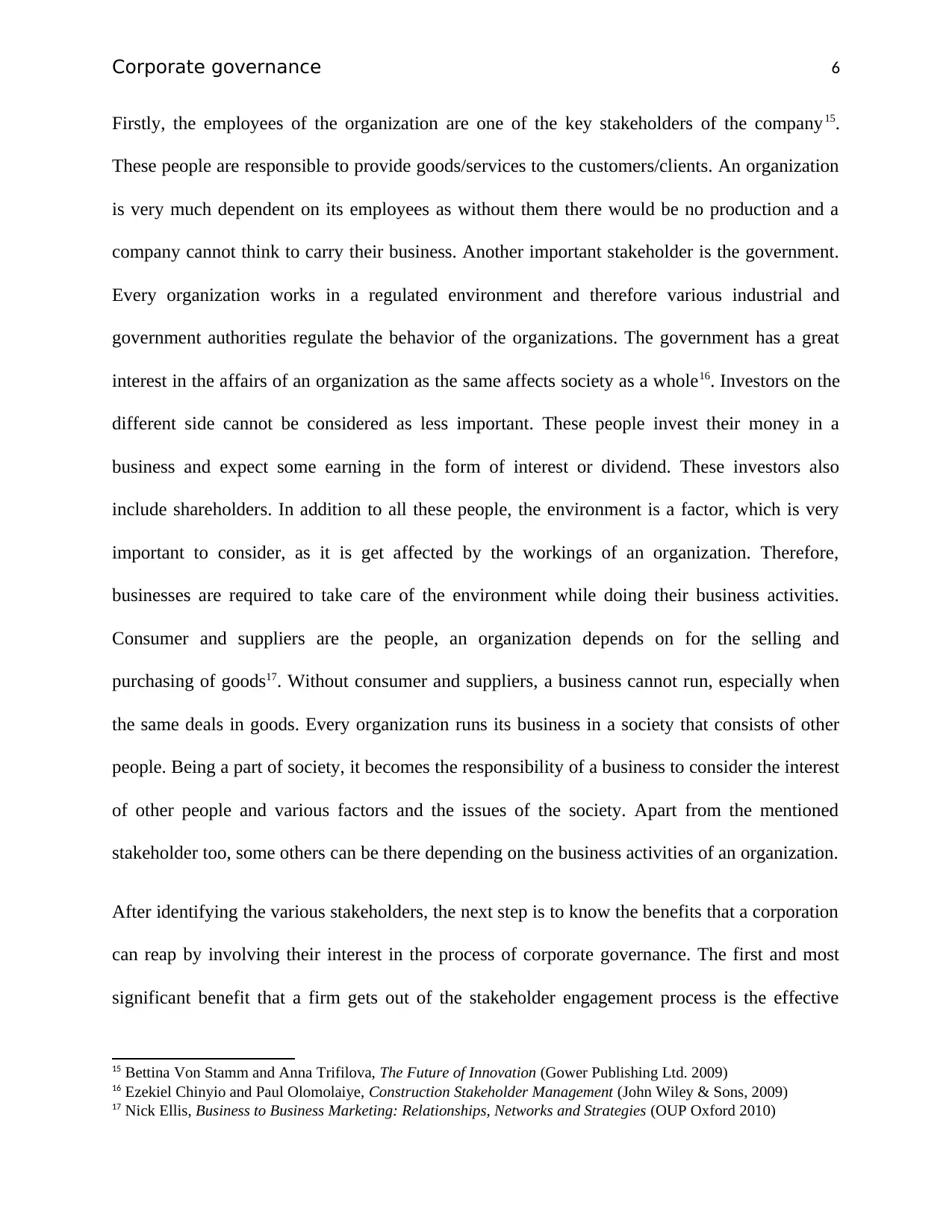
Corporate governance 6
Firstly, the employees of the organization are one of the key stakeholders of the company15.
These people are responsible to provide goods/services to the customers/clients. An organization
is very much dependent on its employees as without them there would be no production and a
company cannot think to carry their business. Another important stakeholder is the government.
Every organization works in a regulated environment and therefore various industrial and
government authorities regulate the behavior of the organizations. The government has a great
interest in the affairs of an organization as the same affects society as a whole16. Investors on the
different side cannot be considered as less important. These people invest their money in a
business and expect some earning in the form of interest or dividend. These investors also
include shareholders. In addition to all these people, the environment is a factor, which is very
important to consider, as it is get affected by the workings of an organization. Therefore,
businesses are required to take care of the environment while doing their business activities.
Consumer and suppliers are the people, an organization depends on for the selling and
purchasing of goods17. Without consumer and suppliers, a business cannot run, especially when
the same deals in goods. Every organization runs its business in a society that consists of other
people. Being a part of society, it becomes the responsibility of a business to consider the interest
of other people and various factors and the issues of the society. Apart from the mentioned
stakeholder too, some others can be there depending on the business activities of an organization.
After identifying the various stakeholders, the next step is to know the benefits that a corporation
can reap by involving their interest in the process of corporate governance. The first and most
significant benefit that a firm gets out of the stakeholder engagement process is the effective
15 Bettina Von Stamm and Anna Trifilova, The Future of Innovation (Gower Publishing Ltd. 2009)
16 Ezekiel Chinyio and Paul Olomolaiye, Construction Stakeholder Management (John Wiley & Sons, 2009)
17 Nick Ellis, Business to Business Marketing: Relationships, Networks and Strategies (OUP Oxford 2010)
Firstly, the employees of the organization are one of the key stakeholders of the company15.
These people are responsible to provide goods/services to the customers/clients. An organization
is very much dependent on its employees as without them there would be no production and a
company cannot think to carry their business. Another important stakeholder is the government.
Every organization works in a regulated environment and therefore various industrial and
government authorities regulate the behavior of the organizations. The government has a great
interest in the affairs of an organization as the same affects society as a whole16. Investors on the
different side cannot be considered as less important. These people invest their money in a
business and expect some earning in the form of interest or dividend. These investors also
include shareholders. In addition to all these people, the environment is a factor, which is very
important to consider, as it is get affected by the workings of an organization. Therefore,
businesses are required to take care of the environment while doing their business activities.
Consumer and suppliers are the people, an organization depends on for the selling and
purchasing of goods17. Without consumer and suppliers, a business cannot run, especially when
the same deals in goods. Every organization runs its business in a society that consists of other
people. Being a part of society, it becomes the responsibility of a business to consider the interest
of other people and various factors and the issues of the society. Apart from the mentioned
stakeholder too, some others can be there depending on the business activities of an organization.
After identifying the various stakeholders, the next step is to know the benefits that a corporation
can reap by involving their interest in the process of corporate governance. The first and most
significant benefit that a firm gets out of the stakeholder engagement process is the effective
15 Bettina Von Stamm and Anna Trifilova, The Future of Innovation (Gower Publishing Ltd. 2009)
16 Ezekiel Chinyio and Paul Olomolaiye, Construction Stakeholder Management (John Wiley & Sons, 2009)
17 Nick Ellis, Business to Business Marketing: Relationships, Networks and Strategies (OUP Oxford 2010)
Paraphrase This Document
Need a fresh take? Get an instant paraphrase of this document with our AI Paraphraser
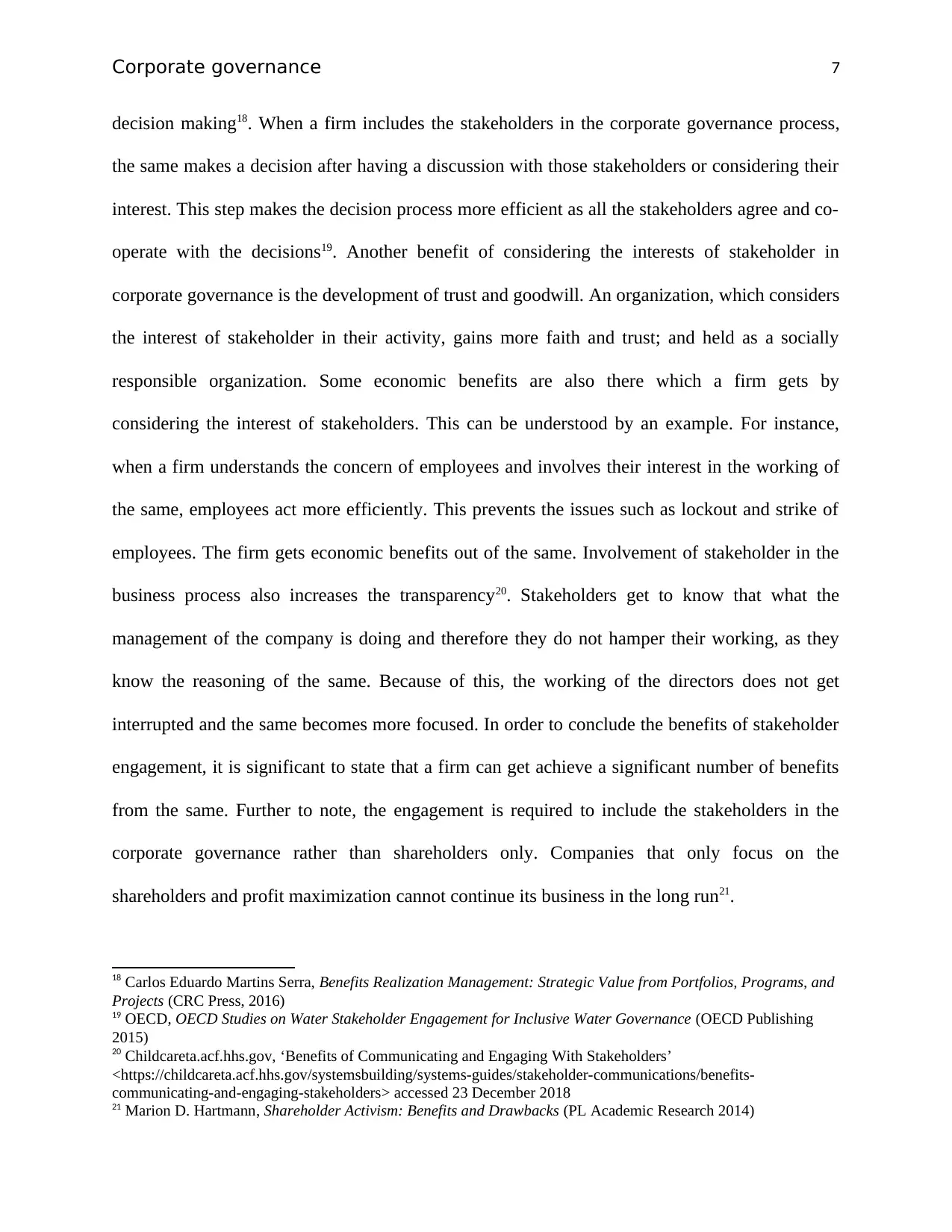
Corporate governance 7
decision making18. When a firm includes the stakeholders in the corporate governance process,
the same makes a decision after having a discussion with those stakeholders or considering their
interest. This step makes the decision process more efficient as all the stakeholders agree and co-
operate with the decisions19. Another benefit of considering the interests of stakeholder in
corporate governance is the development of trust and goodwill. An organization, which considers
the interest of stakeholder in their activity, gains more faith and trust; and held as a socially
responsible organization. Some economic benefits are also there which a firm gets by
considering the interest of stakeholders. This can be understood by an example. For instance,
when a firm understands the concern of employees and involves their interest in the working of
the same, employees act more efficiently. This prevents the issues such as lockout and strike of
employees. The firm gets economic benefits out of the same. Involvement of stakeholder in the
business process also increases the transparency20. Stakeholders get to know that what the
management of the company is doing and therefore they do not hamper their working, as they
know the reasoning of the same. Because of this, the working of the directors does not get
interrupted and the same becomes more focused. In order to conclude the benefits of stakeholder
engagement, it is significant to state that a firm can get achieve a significant number of benefits
from the same. Further to note, the engagement is required to include the stakeholders in the
corporate governance rather than shareholders only. Companies that only focus on the
shareholders and profit maximization cannot continue its business in the long run21.
18 Carlos Eduardo Martins Serra, Benefits Realization Management: Strategic Value from Portfolios, Programs, and
Projects (CRC Press, 2016)
19 OECD, OECD Studies on Water Stakeholder Engagement for Inclusive Water Governance (OECD Publishing
2015)
20 Childcareta.acf.hhs.gov, ‘Benefits of Communicating and Engaging With Stakeholders’
<https://childcareta.acf.hhs.gov/systemsbuilding/systems-guides/stakeholder-communications/benefits-
communicating-and-engaging-stakeholders> accessed 23 December 2018
21 Marion D. Hartmann, Shareholder Activism: Benefits and Drawbacks (PL Academic Research 2014)
decision making18. When a firm includes the stakeholders in the corporate governance process,
the same makes a decision after having a discussion with those stakeholders or considering their
interest. This step makes the decision process more efficient as all the stakeholders agree and co-
operate with the decisions19. Another benefit of considering the interests of stakeholder in
corporate governance is the development of trust and goodwill. An organization, which considers
the interest of stakeholder in their activity, gains more faith and trust; and held as a socially
responsible organization. Some economic benefits are also there which a firm gets by
considering the interest of stakeholders. This can be understood by an example. For instance,
when a firm understands the concern of employees and involves their interest in the working of
the same, employees act more efficiently. This prevents the issues such as lockout and strike of
employees. The firm gets economic benefits out of the same. Involvement of stakeholder in the
business process also increases the transparency20. Stakeholders get to know that what the
management of the company is doing and therefore they do not hamper their working, as they
know the reasoning of the same. Because of this, the working of the directors does not get
interrupted and the same becomes more focused. In order to conclude the benefits of stakeholder
engagement, it is significant to state that a firm can get achieve a significant number of benefits
from the same. Further to note, the engagement is required to include the stakeholders in the
corporate governance rather than shareholders only. Companies that only focus on the
shareholders and profit maximization cannot continue its business in the long run21.
18 Carlos Eduardo Martins Serra, Benefits Realization Management: Strategic Value from Portfolios, Programs, and
Projects (CRC Press, 2016)
19 OECD, OECD Studies on Water Stakeholder Engagement for Inclusive Water Governance (OECD Publishing
2015)
20 Childcareta.acf.hhs.gov, ‘Benefits of Communicating and Engaging With Stakeholders’
<https://childcareta.acf.hhs.gov/systemsbuilding/systems-guides/stakeholder-communications/benefits-
communicating-and-engaging-stakeholders> accessed 23 December 2018
21 Marion D. Hartmann, Shareholder Activism: Benefits and Drawbacks (PL Academic Research 2014)
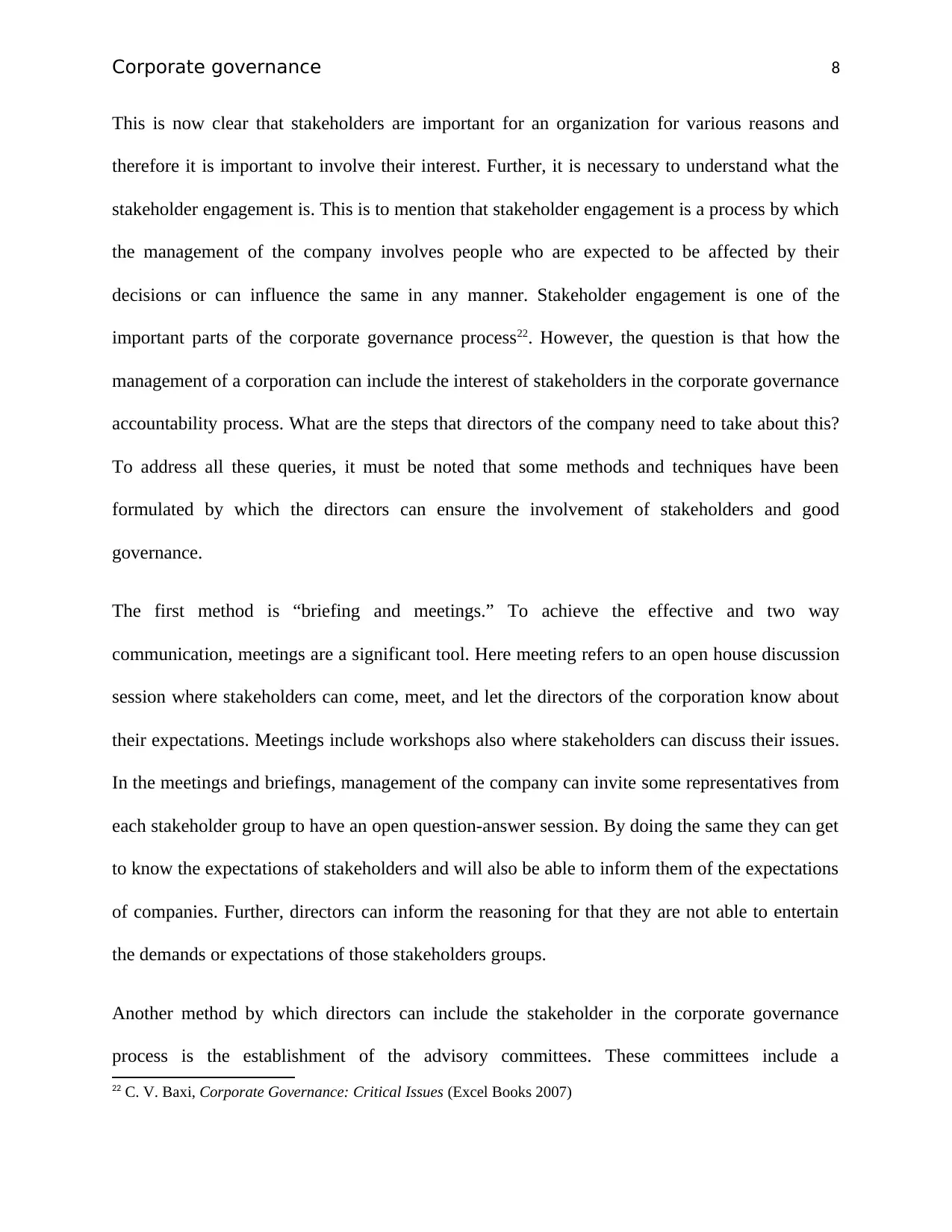
Corporate governance 8
This is now clear that stakeholders are important for an organization for various reasons and
therefore it is important to involve their interest. Further, it is necessary to understand what the
stakeholder engagement is. This is to mention that stakeholder engagement is a process by which
the management of the company involves people who are expected to be affected by their
decisions or can influence the same in any manner. Stakeholder engagement is one of the
important parts of the corporate governance process22. However, the question is that how the
management of a corporation can include the interest of stakeholders in the corporate governance
accountability process. What are the steps that directors of the company need to take about this?
To address all these queries, it must be noted that some methods and techniques have been
formulated by which the directors can ensure the involvement of stakeholders and good
governance.
The first method is “briefing and meetings.” To achieve the effective and two way
communication, meetings are a significant tool. Here meeting refers to an open house discussion
session where stakeholders can come, meet, and let the directors of the corporation know about
their expectations. Meetings include workshops also where stakeholders can discuss their issues.
In the meetings and briefings, management of the company can invite some representatives from
each stakeholder group to have an open question-answer session. By doing the same they can get
to know the expectations of stakeholders and will also be able to inform them of the expectations
of companies. Further, directors can inform the reasoning for that they are not able to entertain
the demands or expectations of those stakeholders groups.
Another method by which directors can include the stakeholder in the corporate governance
process is the establishment of the advisory committees. These committees include a
22 C. V. Baxi, Corporate Governance: Critical Issues (Excel Books 2007)
This is now clear that stakeholders are important for an organization for various reasons and
therefore it is important to involve their interest. Further, it is necessary to understand what the
stakeholder engagement is. This is to mention that stakeholder engagement is a process by which
the management of the company involves people who are expected to be affected by their
decisions or can influence the same in any manner. Stakeholder engagement is one of the
important parts of the corporate governance process22. However, the question is that how the
management of a corporation can include the interest of stakeholders in the corporate governance
accountability process. What are the steps that directors of the company need to take about this?
To address all these queries, it must be noted that some methods and techniques have been
formulated by which the directors can ensure the involvement of stakeholders and good
governance.
The first method is “briefing and meetings.” To achieve the effective and two way
communication, meetings are a significant tool. Here meeting refers to an open house discussion
session where stakeholders can come, meet, and let the directors of the corporation know about
their expectations. Meetings include workshops also where stakeholders can discuss their issues.
In the meetings and briefings, management of the company can invite some representatives from
each stakeholder group to have an open question-answer session. By doing the same they can get
to know the expectations of stakeholders and will also be able to inform them of the expectations
of companies. Further, directors can inform the reasoning for that they are not able to entertain
the demands or expectations of those stakeholders groups.
Another method by which directors can include the stakeholder in the corporate governance
process is the establishment of the advisory committees. These committees include a
22 C. V. Baxi, Corporate Governance: Critical Issues (Excel Books 2007)
⊘ This is a preview!⊘
Do you want full access?
Subscribe today to unlock all pages.

Trusted by 1+ million students worldwide
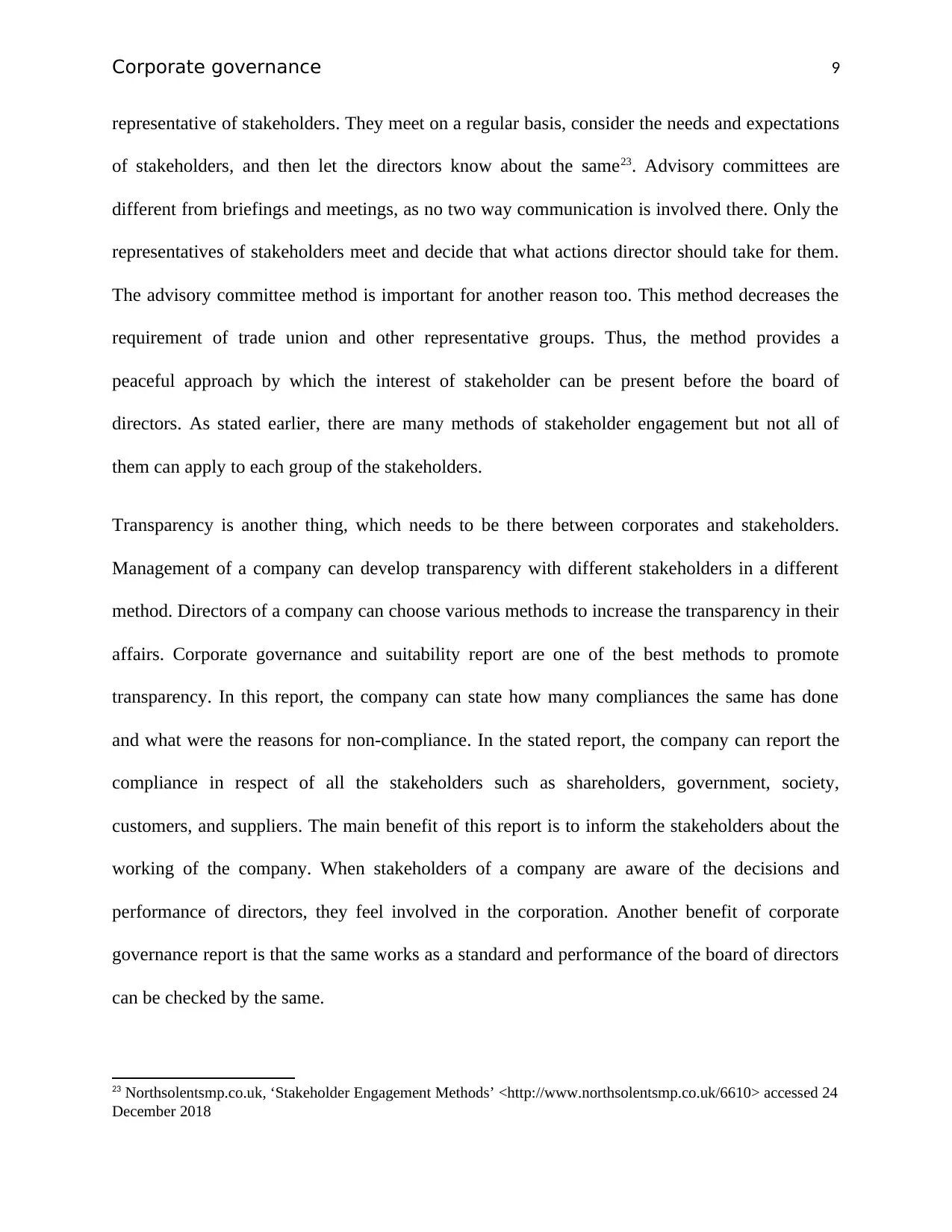
Corporate governance 9
representative of stakeholders. They meet on a regular basis, consider the needs and expectations
of stakeholders, and then let the directors know about the same23. Advisory committees are
different from briefings and meetings, as no two way communication is involved there. Only the
representatives of stakeholders meet and decide that what actions director should take for them.
The advisory committee method is important for another reason too. This method decreases the
requirement of trade union and other representative groups. Thus, the method provides a
peaceful approach by which the interest of stakeholder can be present before the board of
directors. As stated earlier, there are many methods of stakeholder engagement but not all of
them can apply to each group of the stakeholders.
Transparency is another thing, which needs to be there between corporates and stakeholders.
Management of a company can develop transparency with different stakeholders in a different
method. Directors of a company can choose various methods to increase the transparency in their
affairs. Corporate governance and suitability report are one of the best methods to promote
transparency. In this report, the company can state how many compliances the same has done
and what were the reasons for non-compliance. In the stated report, the company can report the
compliance in respect of all the stakeholders such as shareholders, government, society,
customers, and suppliers. The main benefit of this report is to inform the stakeholders about the
working of the company. When stakeholders of a company are aware of the decisions and
performance of directors, they feel involved in the corporation. Another benefit of corporate
governance report is that the same works as a standard and performance of the board of directors
can be checked by the same.
23 Northsolentsmp.co.uk, ‘Stakeholder Engagement Methods’ <http://www.northsolentsmp.co.uk/6610> accessed 24
December 2018
representative of stakeholders. They meet on a regular basis, consider the needs and expectations
of stakeholders, and then let the directors know about the same23. Advisory committees are
different from briefings and meetings, as no two way communication is involved there. Only the
representatives of stakeholders meet and decide that what actions director should take for them.
The advisory committee method is important for another reason too. This method decreases the
requirement of trade union and other representative groups. Thus, the method provides a
peaceful approach by which the interest of stakeholder can be present before the board of
directors. As stated earlier, there are many methods of stakeholder engagement but not all of
them can apply to each group of the stakeholders.
Transparency is another thing, which needs to be there between corporates and stakeholders.
Management of a company can develop transparency with different stakeholders in a different
method. Directors of a company can choose various methods to increase the transparency in their
affairs. Corporate governance and suitability report are one of the best methods to promote
transparency. In this report, the company can state how many compliances the same has done
and what were the reasons for non-compliance. In the stated report, the company can report the
compliance in respect of all the stakeholders such as shareholders, government, society,
customers, and suppliers. The main benefit of this report is to inform the stakeholders about the
working of the company. When stakeholders of a company are aware of the decisions and
performance of directors, they feel involved in the corporation. Another benefit of corporate
governance report is that the same works as a standard and performance of the board of directors
can be checked by the same.
23 Northsolentsmp.co.uk, ‘Stakeholder Engagement Methods’ <http://www.northsolentsmp.co.uk/6610> accessed 24
December 2018
Paraphrase This Document
Need a fresh take? Get an instant paraphrase of this document with our AI Paraphraser
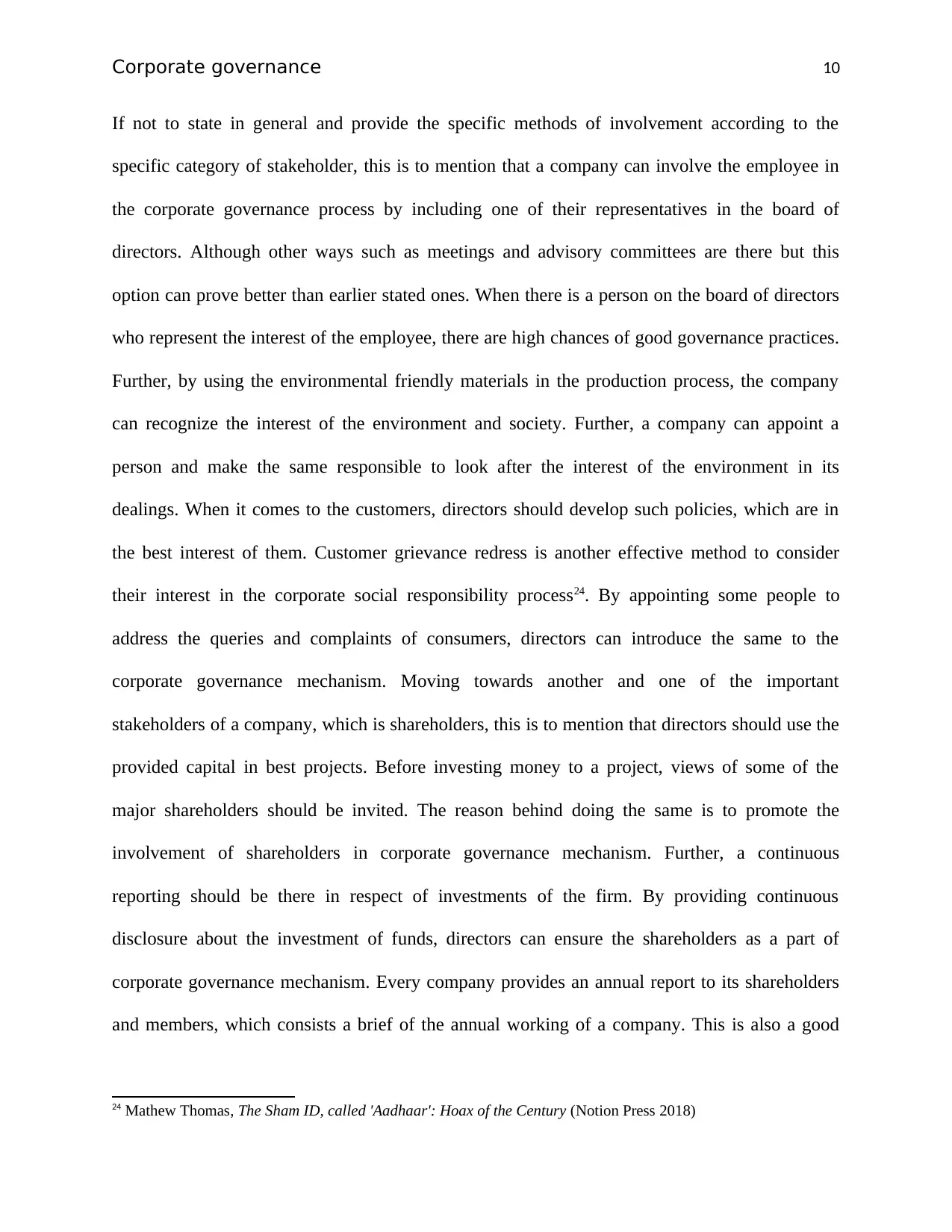
Corporate governance 10
If not to state in general and provide the specific methods of involvement according to the
specific category of stakeholder, this is to mention that a company can involve the employee in
the corporate governance process by including one of their representatives in the board of
directors. Although other ways such as meetings and advisory committees are there but this
option can prove better than earlier stated ones. When there is a person on the board of directors
who represent the interest of the employee, there are high chances of good governance practices.
Further, by using the environmental friendly materials in the production process, the company
can recognize the interest of the environment and society. Further, a company can appoint a
person and make the same responsible to look after the interest of the environment in its
dealings. When it comes to the customers, directors should develop such policies, which are in
the best interest of them. Customer grievance redress is another effective method to consider
their interest in the corporate social responsibility process24. By appointing some people to
address the queries and complaints of consumers, directors can introduce the same to the
corporate governance mechanism. Moving towards another and one of the important
stakeholders of a company, which is shareholders, this is to mention that directors should use the
provided capital in best projects. Before investing money to a project, views of some of the
major shareholders should be invited. The reason behind doing the same is to promote the
involvement of shareholders in corporate governance mechanism. Further, a continuous
reporting should be there in respect of investments of the firm. By providing continuous
disclosure about the investment of funds, directors can ensure the shareholders as a part of
corporate governance mechanism. Every company provides an annual report to its shareholders
and members, which consists a brief of the annual working of a company. This is also a good
24 Mathew Thomas, The Sham ID, called 'Aadhaar': Hoax of the Century (Notion Press 2018)
If not to state in general and provide the specific methods of involvement according to the
specific category of stakeholder, this is to mention that a company can involve the employee in
the corporate governance process by including one of their representatives in the board of
directors. Although other ways such as meetings and advisory committees are there but this
option can prove better than earlier stated ones. When there is a person on the board of directors
who represent the interest of the employee, there are high chances of good governance practices.
Further, by using the environmental friendly materials in the production process, the company
can recognize the interest of the environment and society. Further, a company can appoint a
person and make the same responsible to look after the interest of the environment in its
dealings. When it comes to the customers, directors should develop such policies, which are in
the best interest of them. Customer grievance redress is another effective method to consider
their interest in the corporate social responsibility process24. By appointing some people to
address the queries and complaints of consumers, directors can introduce the same to the
corporate governance mechanism. Moving towards another and one of the important
stakeholders of a company, which is shareholders, this is to mention that directors should use the
provided capital in best projects. Before investing money to a project, views of some of the
major shareholders should be invited. The reason behind doing the same is to promote the
involvement of shareholders in corporate governance mechanism. Further, a continuous
reporting should be there in respect of investments of the firm. By providing continuous
disclosure about the investment of funds, directors can ensure the shareholders as a part of
corporate governance mechanism. Every company provides an annual report to its shareholders
and members, which consists a brief of the annual working of a company. This is also a good
24 Mathew Thomas, The Sham ID, called 'Aadhaar': Hoax of the Century (Notion Press 2018)
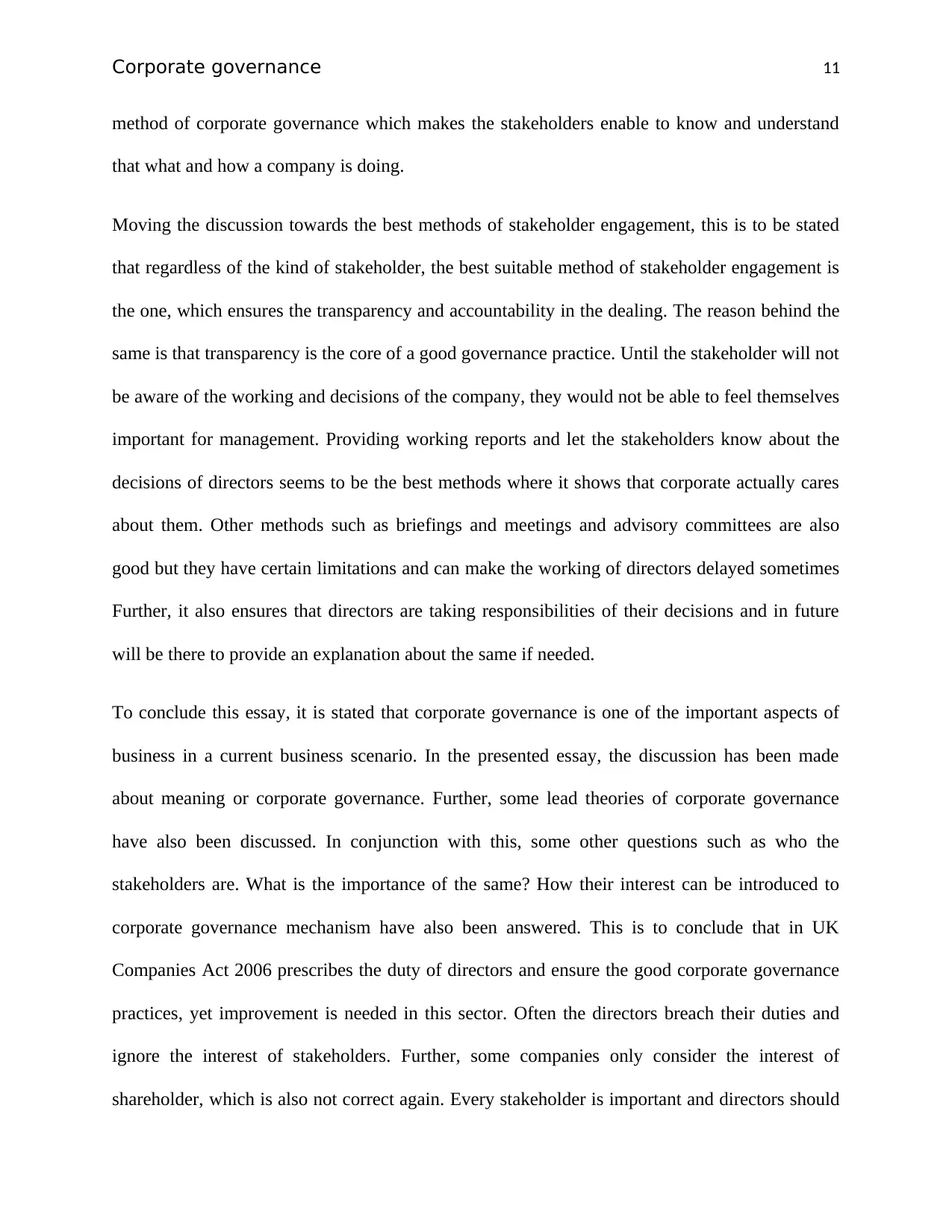
Corporate governance 11
method of corporate governance which makes the stakeholders enable to know and understand
that what and how a company is doing.
Moving the discussion towards the best methods of stakeholder engagement, this is to be stated
that regardless of the kind of stakeholder, the best suitable method of stakeholder engagement is
the one, which ensures the transparency and accountability in the dealing. The reason behind the
same is that transparency is the core of a good governance practice. Until the stakeholder will not
be aware of the working and decisions of the company, they would not be able to feel themselves
important for management. Providing working reports and let the stakeholders know about the
decisions of directors seems to be the best methods where it shows that corporate actually cares
about them. Other methods such as briefings and meetings and advisory committees are also
good but they have certain limitations and can make the working of directors delayed sometimes
Further, it also ensures that directors are taking responsibilities of their decisions and in future
will be there to provide an explanation about the same if needed.
To conclude this essay, it is stated that corporate governance is one of the important aspects of
business in a current business scenario. In the presented essay, the discussion has been made
about meaning or corporate governance. Further, some lead theories of corporate governance
have also been discussed. In conjunction with this, some other questions such as who the
stakeholders are. What is the importance of the same? How their interest can be introduced to
corporate governance mechanism have also been answered. This is to conclude that in UK
Companies Act 2006 prescribes the duty of directors and ensure the good corporate governance
practices, yet improvement is needed in this sector. Often the directors breach their duties and
ignore the interest of stakeholders. Further, some companies only consider the interest of
shareholder, which is also not correct again. Every stakeholder is important and directors should
method of corporate governance which makes the stakeholders enable to know and understand
that what and how a company is doing.
Moving the discussion towards the best methods of stakeholder engagement, this is to be stated
that regardless of the kind of stakeholder, the best suitable method of stakeholder engagement is
the one, which ensures the transparency and accountability in the dealing. The reason behind the
same is that transparency is the core of a good governance practice. Until the stakeholder will not
be aware of the working and decisions of the company, they would not be able to feel themselves
important for management. Providing working reports and let the stakeholders know about the
decisions of directors seems to be the best methods where it shows that corporate actually cares
about them. Other methods such as briefings and meetings and advisory committees are also
good but they have certain limitations and can make the working of directors delayed sometimes
Further, it also ensures that directors are taking responsibilities of their decisions and in future
will be there to provide an explanation about the same if needed.
To conclude this essay, it is stated that corporate governance is one of the important aspects of
business in a current business scenario. In the presented essay, the discussion has been made
about meaning or corporate governance. Further, some lead theories of corporate governance
have also been discussed. In conjunction with this, some other questions such as who the
stakeholders are. What is the importance of the same? How their interest can be introduced to
corporate governance mechanism have also been answered. This is to conclude that in UK
Companies Act 2006 prescribes the duty of directors and ensure the good corporate governance
practices, yet improvement is needed in this sector. Often the directors breach their duties and
ignore the interest of stakeholders. Further, some companies only consider the interest of
shareholder, which is also not correct again. Every stakeholder is important and directors should
⊘ This is a preview!⊘
Do you want full access?
Subscribe today to unlock all pages.

Trusted by 1+ million students worldwide
1 out of 15
Related Documents
Your All-in-One AI-Powered Toolkit for Academic Success.
+13062052269
info@desklib.com
Available 24*7 on WhatsApp / Email
![[object Object]](/_next/static/media/star-bottom.7253800d.svg)
Unlock your academic potential
Copyright © 2020–2026 A2Z Services. All Rights Reserved. Developed and managed by ZUCOL.




